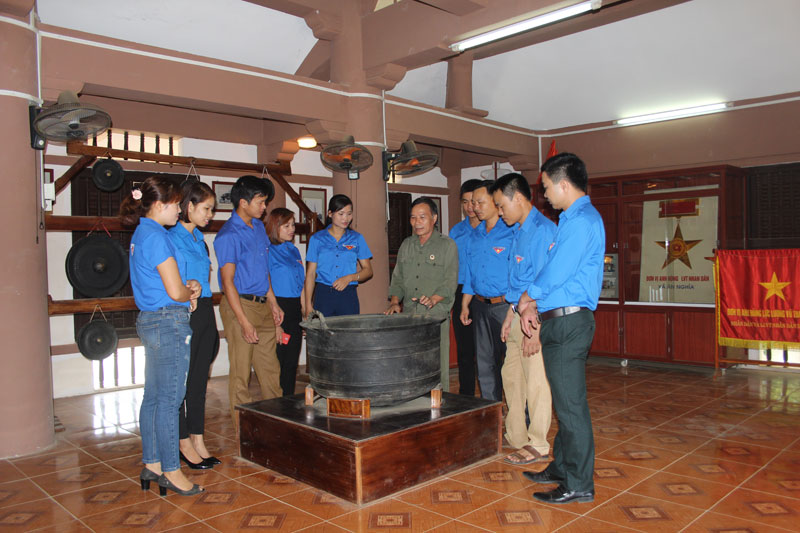
(HBO) – Visiting Muong Khoi commune in Lac Son district of Hoa Binh province in August, we recalled the revolutionary days 72 years ago. Making a tour around the site with Bui Minh Duc, former Secretary of the An Nghia communal Party Committee and member of the communal Veteran Association, we knew more about major historical events at the site as well as the patriotism of the soldiers, that greatly contributed to the victory of the August Revolution in 1945.
Bui Minh Duc, former Secretary of An Nghia commune’s Party Committee and member of the communal Veteran Association introduces to youngsters the copper cooker to cook rice for soldiers during the August Revolution in 1945.
Former Muong Khoi comprised Hoai An and Hieu Nghia communes, which is now An Nghia and Tan My communes in the northeastern of Lac Son district. It was chosen as a revolutionary base to prepare for the uprising to seize power. A partisan platoon led by Quach Ruong was formed in Muong Khoi at that time. The troop with primitive weapons kept on training days and nights to be ready for uprising. The provincial Party Delegation chose the place to open a military training course for 12 youngsters of Vu Ban and 40 others of Hoai An and Hieu Nghia.
Bui Minh Duc said that in July 1945, Vuong Thua Vu and Bach Dang Phong chose Lot hamlet and the house of Bui Van Khuynh as a the location to open a course to train key officials of Son La, Hoa Binh, Ha Nam, Ha Dong, Son Tay, Nam Dinh, Thai Binh, Ninh Binh provinces and Hanoi, improving their political and defence knowledge and skills to encourage the community to build the base, as well as experience in directing the uprising.
Cuu quoc (national savage) groups in Vu Ban and Muong Khoi exerted every efforts to care for and protect officials joining the course when the nation was suffering the severe hunger in 1945.
Locals and Cuu quoc groups in Muong Khoi completed the tasks assigned by the Party, which showed the solidarity and revolutionary spirit of the whole nation in fighting the French colonists.
Throughout the night of August 19, 1945, locals lit torches and joined soldiers to sing revolutionary songs. Amidst the public’s magnanimous revolutionary spirit in the base, the lackeys under French domination in Hoai An and Hieu Nghia were too frightened, so many of them voluntarily handed over food, foodstuff and copper seals to the revolution.
On August 20, 1945, soldiers and locals in Muong Khoi coordinated with Cuu quoc groups and locals in Vu Ban conducted uprising. District chief Quach Ham surrendered and handed over all documents and seals to the revolution.
On August 21, 1945, nearly 50 partisans and hundreds of locals in Muong Khoi base and Vu Ban town upheld the red flag with the yellow star in the middle, and headed to Hoa Binh town on road 12A to join with forces in Cao Phong-Thach Yen and Tu Ly-Hien Luong revolutionary bases to launch an attack, seizing power on August 23, 1945.
Bui Van Dan, Chairman of the An Nghia commune People’s Committee said that as part of efforts to inherit and promote the patriotism tradition of the homeland, the commune’s Party Committee and government have effectively implemented socio-economic tasks and targets.
Economic growth of the commune in the first six months of 2017 reached 9.3 percent, with per capita income hitting 17.6 million VND, and poverty ratio reducing to 10.7 percent. Currently, An Nghia has fulfilled 13 out of 19 criteria for a new-style rural area.
Living green is a healthy, positive, and sustainable lifestyle that not only helps protect
the environment and quality of life but also conserves natural resources and ecosystems.
Among the many ways to embrace this lifestyle, reducing plastic consumption is one of the most impactful.
The women's unions at all levels in Kim Boi district have been making significant contributions to the movement of building cultural life in the local community.
The movement helps improve rural look and the spiritual and material lives of local residents.
The Hoa Binh provincial People’s Committee has issued an action plan to ensure food safety, promote processing, and develop the market for agricultural, forestry, and fishery products in 2025.
In recent years, the development of rural handicrafts has not only helped preserve and promote the traditional values but it has also created jobs and improved incomes for the local residents.
By harmoniously combining traditional medicine with modern medical practices, the Hoa Binh Traditional Medicine Hospital is strengthening its role in the province’s healthcare system.



